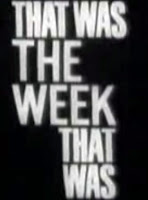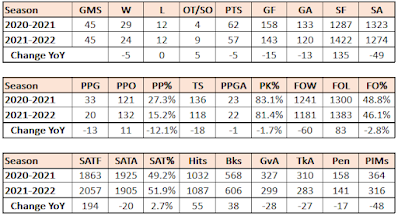It was a losing week for the Washington Capitals in Week 16, but oddly enough, it wasd a week that had a spark of hope that their long, difficult January might give way to a more successful February.
It is rare indeed when a 1-2-0 record might have the word “encouraging” attached to it, but from out chair, that word fits. It was a week in which the defense showed up and goaltending, well, one goaltender shined. But before we think a 1-2-0 record is a good thing, keep in mind that this was the third week in the last six in which the Caps had a losing record. Add the two break-even weeks in this six-week run, and it adds up to an extended poor stretch over which the Caps went 6-7-2, their .467 points percentage tied for 21st in the league over that span.
It was not a good week in the offensive end. The Caps finished tied for the fifth-lowest goals per game for the week. Six different Caps recorded a single goal – Nicklas Backstrom, John Carlson, Tom Wilson, Trevor van Riemsdyk, Daniel Sprong, and Connor McMichael. For van Riemsdyk, it was his first goal of the season and snapped a 55-game streak without one dating back to last season.
Nicklas Backstrom led the way with four points – figuring in on two-thirds of the goals scored by the Caps in Week 16. Evgeny Kuznetsov and Connor McMichael were the other Caps to register multi-point weeks (two apiece).
It was a bit of a frustrating week for Alex Ovechkin, who led the Caps with 15 shots on goal in the three games. His three-game streak without a goal follows on to a more productive stretch of five goals in five games. John Carlson’s goal in Week 17 snapped a six=game streak without a point, while McMichael ended a seven-game streak without a goal when he scored against Dallas in the 5-0 win to end the week.
Defense: 1.67 / game (season: 2.67 / 7th)
When the Caps allowed the San Jose Sharks 30 shots on goal in the middle game of the week, it was only the 18th time in 44 games that the Caps allowed 30 or more shots. They finished the week tied with Dallas for fourth fewest games allowing 30 or more shots on goal. The Caps did not quite get to 30 in their 5-0 win over the Stars, getting to 29 in the win.
Among the 14 teams to play three games in Wee 16, the Caps allowed 141 shot attempts at 5-on-5, tied for eighth-fewest with Carolina in that group. Their minus-2 shot attempt differential was seventh-best among that group.
Alex Ovechkin and Lars Eller were on ice for three of the four 5-on-5 goals scored against the Caps for the week.
Goaltending: 1.36 / .954 / 1 shutout (season: 2.52 / .910 / 6 shutouts)
It was “Viva Vitek” in Week 16. In two games and 118 minutes of play, Vitek Vanecek stopped 57 of 58 shots on goal (.983 save percentage, best in the league for the week) and had a 0.51 goals against average (also best in the league for the week). January has been kind to Vanecek, who is 4-2-0, 2.00, .929, with two shutouts for the month. The 5-0 shutout against the Stars gave him two shutouts in three road games this month and the second-best road save percentage (.953) in the league in January among goalies with at least three road games played (Robin Lehner: .957).
It was not so much that Ilya Samsonov was poor in his lone game of the week, only that it paled next to Vanecek’s performance. He allowed three goals on 29 shots in a 4-1 loss to San Jose, one of those goals coming after he was knocked down and looked a bit groggy afterward in the third period of that loss. It ended a rather unfortunate month for Samsonov – 0-3-1, 3.84, .876. This is concerning, given that his save percentage has dropped from .919 in November to .895 in December, and now to .876 this month.
Power Play: 2-for-10 / 20.0 percent (season: percent 15.2 percent / 30th).
A second straight week at 20 percent on the power play. It might not sound like much, but it is the first time the Caps put together consecutive weeks at 20 or more percent since Weeks 6 and 7, when they were 25.0 percent in each week, the only other time this season they posted consecutive 20-plus percent on the power play.
What was encouraging about the power play was the “who” as much as the “how many.” John Carlson had one of the power play strikes, his first power play goal since November 24th, breaking a 20-game streak without a power play goal and his first power play point since November 28th, an 18-game streak broken.
Tom Wilson had the other power play goal, his third of the season, and it was scored from the axle of the 1-3-1 formation, where the Caps’ production has been lacking most of this season, in no small part due to the absence of T.J. Oshie, who normally mans that spot on the top power play unit.
After two weeks over which the Caps went 13-for-20 on the penalty kill (65.0 percent), a perfect week was the perfect tonic for a penalty kill that was doing precious little killing. It was the seventh week in 16 in which the Caps were 100 percent on the PK that, while appreciated, is in curious balance with six weeks in 16 in which they were 75 percent or lower.
If there was a downside, it was that the Caps trended to the high side of shorthanded situations per game (2.67) relative to the rest of the league (they were tied for sixth-most in the league for the week.
Another sub-50 percent week, and a pattern of performance seems to have settled in. Nic Dowd is clearly the best in show when it comes to this skill on this team (team-leading 51.4 percent for the season (players in more than ten games) and 59.1 percent for Week 16). Nicklas Backstrom and Lars Eller have had their moments but have been inconsistent (Backstrom at 49.4 percent for the season, Eller at 48.8 percent). Evgeny Kuznetsov has been consistently poor in this area (43.1 percent, 120th of 135 skaters to take 200 or more draws).
Again, the performance was consistent across the three zones, and not in a good way, although the Caps as a team were only one faceoff loss under 50 percent in the defensive zone for the week. In the offensive zone, Eller and Kuznetsov had their troubles, while in the defensive zone, it was Backstrom having difficulties. Only Dowd – no surprise here – was 50 percent or better in all three zones for the week among Caps who took ten or more faceoffs.
The Caps started well, generally, with a plus-2 first period goal differential and finished decently, a minus-1 differential, but one of the goals against was an empty-netter. It was a close week by period, an indicator of how close the Caps were, even considering the multi-goal loss to San Jose, to having a very good week. Margins of victory and defeat in the NHL are often razor thin.
The two goals yielded by the Caps in three second periods were a good sign for a team that finished their January with 16 second period goals allowed, tied for second most in the league.
Recent weeks have seen a slippage in year-to-year comparisons with last year’s squad, and Week 16 was not an exception. This year’s team has exchanged wins for extra time points (five fewer wins, five more extra time losses). Goals scored and goals allowed are both down from last year, the good and the bad, as it were. This year’s team still has a healthy lead on last year’s team in shots on goal and shot attempts at 5-on-5, and it still does a better job of playing within the confines of the rule book with penalties taken and penalty minutes both reduced from last season. But what sticks out like a sore thumb is the power play, which despite consecutive 20-percent weeks, trails last year’s club badly in power play efficiency.
In the end…
January is in the books, and the Caps might want to toss that book in the Potomac River. It was not a good month for a team that started it tied for the most standings points in the league (47, with Tampa Bay) and finished it tied for eighth in standings points and 12th in points percentage for the season. If there is a takeaway from Week 16, it is that the Caps still have it in them for dominating performances, illustrated by their 5-0 win over Dallas to end the week. The trick as the team heads into February is to string games like his together rather than have them an infrequent occurrence.
Three Stars
- First Star: Vitek Vanecek (1-1-0, 0.51, .983, one shutout)
- Second Star: Nicklas Backstrom (1-3-4, even, six shots on goal, eight shot attempts, no giveaways)
- Third Star: Garnet Hathaway (0-0-0, minus-1, 14 credited hits (tied for team lead), seven blocked shots (led team))








No comments:
Post a Comment